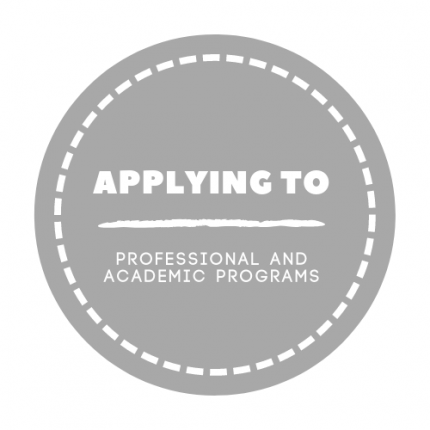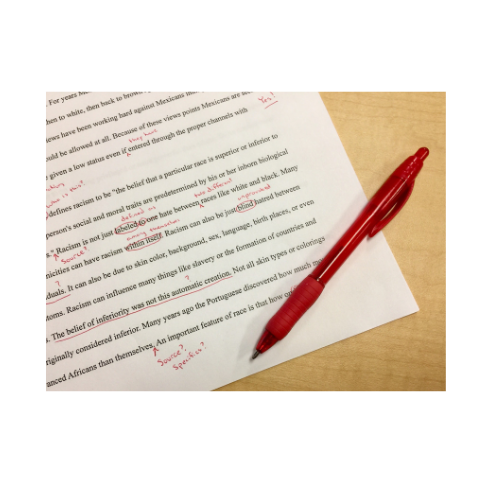Reference Letters
Of all the topics we discuss at the workshop, this is by far the one students want to revisit. I think that letters of reference cause more stress and anxiety in students…but there are strategies that can help minimize that stress and I try to outline some of them below.
Who to ask:
Applications often require two to three letters. Try your best to strike a balance between recommenders who will be able to address the different skills and activities you wish to highlight in your application. For academic programs these usually have to be all faculty, and for professional programs it can be more mixed.
Consider the nature of the program to which you are applying in selecting whom to approach for a letter of recommendation. Ideally, choose a professor who is in the field you are pursuing, and whom you’ve taken an upper-level course with. Of course, at a school like UBC where we depend on contingent faculty (sessional instructors) this is not always possible. Read below if you are not familiar with the ranks and hierarchy of university faculty. If you know this just skip down to where it says “Who to ask, part 2.”
Sessional instructors are people who have PhDs and who are hired to teach classes, but who do not have the benefits or receive the compensation of “tenure track” faculty. It is important to be very thoughtful about whether it is fair to ask sessional instructors to write letters of reference because they are not paid for any “service work” and letter writing is part of full-time or tenure track faculty’s service obligation to the university (in other words, full time faculty are expected to write letters which is anti-anxiety point number one).
Within full time or tenure track faculty there are additional distinctions and I am going to briefly oversimplify them here to give you some idea. Full Professors are the highest rank. To become a Full Professor you have to have an international reputation as a researcher in your subfield. They are older, have broader networks, and are well known in their field. They are excellent people to have write letters, assuming they know you well enough to write one. They are more difficult to get to know because they teach fewer and smaller classes, and often teach graduate students rather than undergraduates. Next up is the Associate Professor. These are research faculty who have been tenured. Generally they are building their reputation, highly productive, and great people to get to know. Below this is the Assistant Professor. This is someone who recently got their PhD or at least who was recently hired. After about six or seven years they will “go up for tenure” and either become Associate Professors or go find a different job. They are super productive and very busy showing that they have what it takes.
UBC actually has a whole other stream of faculty: teaching faculty. These are people like me, an Instructor 1, or if I were tenured, Senior Instructor. If I had worked through the ranks and my educational leadership was known beyond the university, I could become a Professor of Teaching. This stream focuses on educational leadership (instead of research) which basically refers to providing support to ensure that students have a productive learning environment. Many people see these ranks and they scratch their head because it just doesn’t sound as prestigious as “Assistant Professor.” In graduate school my rank was actually “Associate Instructor” and so in some ways I feel like my job at UBC sounds less prestigious than my job as a grad student (but it is DEFINITELY better!). Regardless, the teaching stream are often the people students get to know because we spend more time working with undergraduates.
Finally, UBC has started to hire full-time Lecturers. While not tenure track, Lecturers have a good deal more job security than sessional instructors, and are paid to do some service work, so it is okay to ask them for letters of reference.
Who to ask, part 2:
Besides not asking Sessional Instructors for the reasons outlined above, I think it is okay to ask any of the other ranks for letters with the understanding that the people who know you well will be able to provide detailed letters while those you know less well might provide a more general letter. It is a crapshoot how much any of this matters — some people reading the letters might say, “Oh, Professor Z wrote this, and this student must be amazing!” even though it reads like a form letter. Others might read a highly detailed letter that I write in support of a student who I have worked closely with for two years and say “Who the heck is Kerry Greer and why should I care that she thinks this student is amazing?” To make it even more confusing, lots of people argue that these letters are largely meaningless and that we should stop using them. See this article from Science where our own Professor Rima Wilkes explains her unease with letters. (Anti-anxiety point number two: of all parts of your application, this is the part that probably matters the least.)
When to ask:
Letters of reference take a surprisingly long time to write, and they can’t be easily squeezed into a busy day. Many colleagues write letters on Sunday, when their is a bit of time for thoughtful crafting. For this reason, you should give letter writers, especially for the first letter that they write for you, at least a month to write the letter. This means that you must give them all of the information that they need to write a letter a month before the letter (and the rest of the application) is due.
If you plan to take some time off before going to graduate school, don’t wait until you want to apply to graduate school to ask for letters. Your professors could be on sabbatical, or you may not be fresh in their minds anymore. So, ask professors for a “general” letter of recommendation before you leave. Even though they might not write it, at least they will have agreed and if you asked via email, you can restart the email chain when you are ready for the letter and they might remember you and your work a bit more clearly. They will need help though and this is important to keep in mind when you consider what materials to give them when writing the letter.
How to ask:
You may ask in person, or via email, depending on the situation. Many faculty are busy and scheduling a student meeting just to ask for a letter can take up time they don’t have, but it may be preferable to ask in person, perhaps because you want to remind your letter writer what you look like. In this case, follow up in email to thank them for agreeing to write, so that three or four months later they know they remember that they had agreed to do it. If you have an established relationship with a faculty member, an email is probably fine. This is a place where you have to use your judgement.
If asking in person, preface it by asking to meet with them to discuss your desire to apply to graduate school. During the meeting you will have the opportunity to discuss your academic interests further, and request the letter of recommendation in person.
Always ask the letter writer what their preference is in terms of materials you need to provide and the timeline. I wrote this page based on conversations with other faculty, but everyone has their own preferences and it is your job to discover what each person’s preferences are and adapt to them.
What to provide:
The more information I have on hand when writing a letter, the stronger and more detailed the letter can be. When someone asks me for a letter I give them a list of things I need to have on hand one month before the letter is due. This does two things: it forces the student to get serious about their application, and it weeds out students who are not really sure that they want to apply.
Here is what I ask for (and many of my colleagues request similar things):
- an unofficial copy of your transcript
- your statement of purpose
- a spreadsheet of the programs that they are applying to with due dates, the address of programs, and links to the programs themselves
- an indication of how the letter will be requested and mailed in; most are uploaded to a website, but some schools still require faculty to mail letters or send it as an email attachment
- a CV or resume
- a set of statements that you feel would be important to be included in your letter in mind; not everyone will want this, and it can seem presumptuous to offer it, but it is a good thing to consider. These guiding statements can help you think about who to ask for letters, and the kinds of things they will be able to say about you. If you have worked with someone in multiple capacities, it is generally alright to ask them to speak to one or two areas in their letter
- You might also consider sending copies of any papers you wrote for their classes, along with the grades and comments received on those papers.
Communicate with your recommenders about your goals for graduate study, your career aspirations, and how you chose your schools and programs. Open and close your note with thanks and an acknowledgement of the letter writer’s time. Also be sure to update (with good and bad news) your letter writer!
Reminders, Reminders, Reminders:
You will often receive a notification from the program you are applying to when a letter has been submitted. If you have not received a notification or the letter writer has not indicated that they have submitted a letter, email them and ask/remind them. It may be awkward, but this is a necessary step. Faculty may forget, so a reminder a few days before the deadline is useful.
When I am writing multiple letters for multiple programs for multiple students I fully expect that students are keeping track for me. Realize that faculty can sometimes get away with submitting a letter late — other departments extend this as a professional curtesy. This is not something for you to depend on, but rather don’t get too stressed out if a letter is sent in late. It will not adversely affect your application.


Please sir/Madam
Gud day
I am a high school graduate from Nigeria,and has been able to apply for the UBC scholarship application and therefore reaching a stage of recommendation, therefore I plead for you to come to my aid by helping me with a recommendation letter,
Thank you.
Paul Abwaravi Manassa
A student of Zamaki Academy Yola Adamawa state Nigeria.